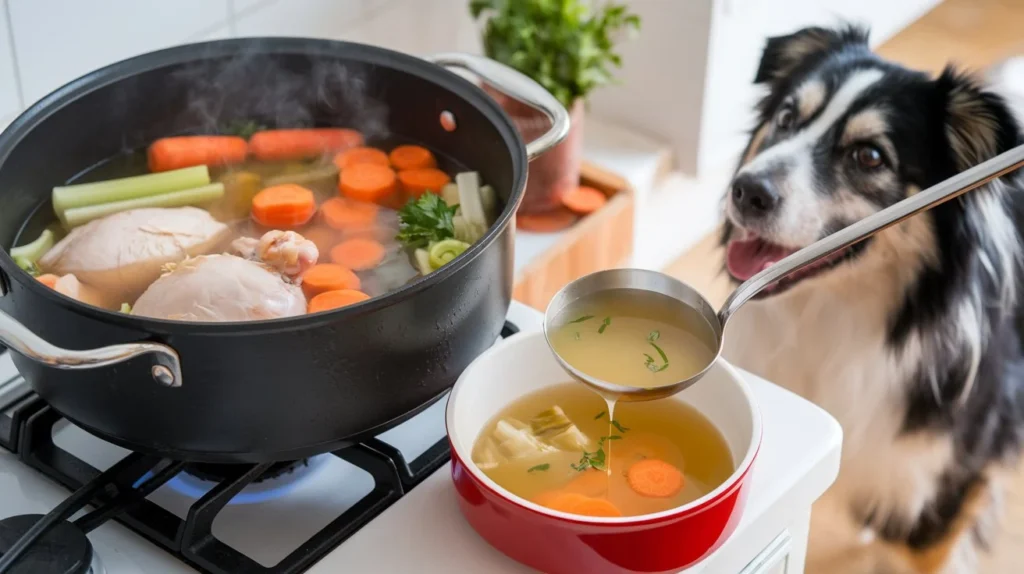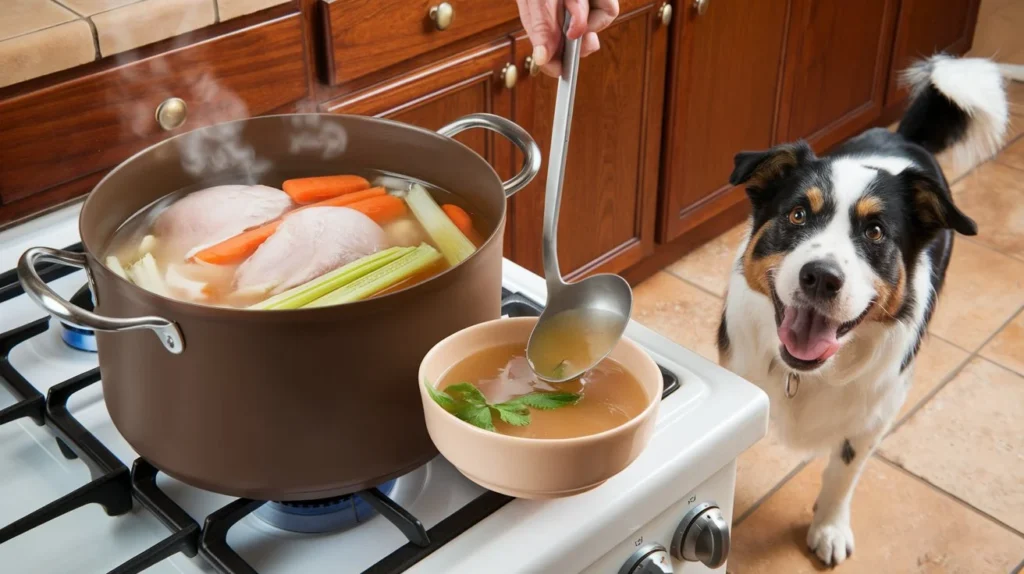Introduction
Chicken broth is a wonderful addition to a dog’s diet, offering not only hydration but also joint support and digestive benefits. By understanding how to make chicken broth for dogs, you can ensure that it is safe, nutritious, and tailored to your pet’s needs. In this guide, we will provide you with everything you need to create a wholesome, homemade broth for your furry friend.

Why Add Chicken Broth to Your Dog’s Diet?
Chicken broth can serve as a beneficial dietary addition for your dog. Packed with essential nutrients like amino acids, minerals, and collagen, it offers more than just a tasty treat.
Boosts Hydration
Most dogs really need to be encouraged to drink a lot of water. Since it is tastier, chicken broth will increase your dog’s intake on a higher scale, especially after workouts or during hot seasons. Proper hydration is essential for your dog’s health, and chicken broth provides an easy way to support their daily fluid intake.
Supports Joint Health
In addition, chicken broth supports joint health, as it contains collagen, glucosamine, and chondroitin, making it especially beneficial for dogs with joint pain or breeds prone to arthritis. Accordingly, consumption on a regular basis may facilitate improvement of joint functionality and relief from pain.
Improves Digestive Health
Moreover, the gelatin extracted from the bones in chicken broth helps strengthen the gut lining and promotes a healthy digestive system. For dogs with sensitive stomachs or gastrointestinal issues, chicken broth can aid in digestion and soothe the gut. As a result, it serves as an excellent dietary supplement for dogs prone to digestive issues.
Encourages Picky Eaters
Otherwise, he adds chicken broth to the food of a picky dog; it will make it more attractive during mealtimes. It only seasons the dry kibbles or whatever food is in there so that they would like to eat better, especially if a dog is recuperating from some kind of sickness or operation.
Key Ingredients for a Healthy Broth
When preparing broth at home, it’s essential to use dog-safe ingredients. Not all foods that are healthy for humans are suitable for dogs.
Chicken Parts with Bones
You can prepare it using a whole chicken or specific parts like wings, backs, or drumsticks. Organic or free-range chicken is better in this application because no dangerous chemicals and antibiotics are used. It’s the bones that pull out the healthy nutrients and gelatin that make broth healthy.
Water
Be sure to use fresh, filtered water as the base for your broth to keep it free from contaminants and harmful additives that could affect your dog’s health.
Apple Cider Vinegar
Adding just a tablespoon of apple cider vinegar helps extract essential minerals from the bones. It also enhances the broth’s flavor, making it more appealing to your dog.
Vegetables (Optional)
Carrots, celery, and parsley can be added for extra nutrition. However, avoid onions and garlic, as these are toxic to dogs and can cause serious health issues.
By using these simple ingredients, you ensure that the broth is both healthy and beneficial for your dog.
Simple Chicken Broth Recipe
Here’s a simple step-by-step guide for making chicken broth for dogs:
Ingredients:
- 2-3 pounds of chicken (with bones)
- 8-10 cups of water
- 1 tablespoon apple cider vinegar
- Optional: 2 carrots, 2 celery stalks
Instructions:
- Prepare the Chicken: Place the chicken in a large stockpot or slow cooker. If using vegetables, chop them into large pieces and add them to the pot.
- Add Water and Vinegar: Pour enough water over the chicken to cover it by at least two inches. Then, add the apple cider vinegar to the pot.
- Simmer: Heat the water until it reaches a rolling boil over high heat.. After that, reduce the heat and let it simmer for 4-6 hours. For a slow cooker, set it to low and let it cook for 8 to 12 hours. The longer the simmering time, the more nutrients will be extracted from the bones.
- Strain the Broth: Once cooking is complete, take out the chicken and vegetables. Strain the broth through a fine-mesh sieve or cheesecloth to remove any bone fragments and vegetable pieces.
- Cool and Store: Let the broth cool until it reaches room temperature. Then, store it in the refrigerator for up to four days or freeze it in portions for longer storage.
Enhancing Your Dog’s Meal with Chicken Broth
Serving chicken broth isn’t limited to just a hydrating drink or standalone treat. Furthermore, it can be utilized in numerous inventive ways to elevate your dog’s everyday meals.
Food Topper
Pouring a bit of warm chicken broth over your dog’s dry food can make even the most ordinary meal more appetizing. The broth hydrates the kibble and enhances its taste, motivating dogs to eat more, particularly if they have become disinterested in their usual food.
Mix with Wet Food
If your dog likes wet food, incorporating some broth into their meals can enhance both the texture and flavor. Consequently, it can also make it easier for older dogs to eat by softening the food further.
Frozen Treats
Freezing chicken broth in ice cube trays provides a cool treat for hot days. These frozen snacks are a delightful way to promote hydration and can be particularly appealing for dogs that need a little extra motivation to drink more water.

Adjusting Chicken Broth for Special Diets
Each dog has its own dietary requirements, and chicken broth can be tailored to address particular health issues or personal tastes.
For Senior Dogs
Senior dogs often have joint issues. using bones high in collagen when making broth can enhance joint support. You might also consider adding small amounts of turmeric for its anti-inflammatory benefits, but be sure to consult your veterinarian before adding any new ingredients.
For Dogs with Allergies
If your dog is allergic to chicken, you can replace it with other meats like turkey or beef to create a similar broth. Always verify that any new ingredients are safe and consult your vet prior to altering your dog’s diet.
For Overweight Dogs
To maintain a low-calorie broth, remove the fat after it has cooled. This step is essential for dogs prone to weight gain to ensure the broth remains light and healthy.
Common Pitfalls to Avoid
Making chicken broth for dogs is straightforward, but there are common mistakes to avoid to ensure your dog’s safety and health.
Using Store-Bought Broth
Store-bought broths often contain high levels of sodium, onions, garlic, and preservatives. These ingredients can be toxic to dogs. Therefore, it’s best to make broth at home using dog-safe ingredients or seek out dog-specific broth options if necessary.
Adding Seasonings
Avoid using seasonings such as salt, pepper, or other spices. Dogs don’t need these, and many spices can upset their stomachs or be harmful. Opt for plain, unseasoned broth to guarantee your dog’s safety.
Serving Cooked Bones
Never serve cooked bones to dogs. They can break apart easily, posing a risk of choking or digestive complications. Always remove and discard the bones after cooking to prevent any potential hazards.
Incorporating Chicken Broth During Recovery
Chicken broth is particularly beneficial for dogs recovering from surgery or illness. The gentle nutrients and hydrating properties of broth can help a dog regain strength without overwhelming their digestive system.
Supporting Recovery
During recovery, some dogs may lose their appetite. As a result , the warm, flavorful broth can motivate them to eat again. For dogs recuperating from gastrointestinal problems, the gelatin found in chicken broth aids in calming the gut and healing the stomach lining.
Chicken Broth as a Treat and Hydration Aid
Besides being a meal supplement, chicken broth is an excellent treat to rehydrate your dog’s body. Pour some into your dog’s water bowl, as this will make them want to drink more water-especially during the really hot seasons. This will come in quite handy for your dog in case it is the type that does not naturally like drinking enough water; the salty flavor will make this process more enjoyable.
Frozen Treats for Summer
Freezing broth into small ice cubes makes for a delightful summer treat. These ice cubes help keep your dog cool and hydrated, transforming a simple nutritional supplement into an entertaining and engaging snack.
FAQs
How much chicken broth should I give my dog?
The amount of chicken broth depends on your dog’s size. For small dogs, start with 1/4 cup, while larger dogs can have 1/2 to 1 cup per serving. Keep an eye on how your dog reacts and modify the quantity as necessary.
Can chicken broth replace water in my dog’s diet?
Although broth can help promote hydration, it should not be a complete substitute for water. Always make sure your dog has access to fresh, clean water to fulfill their hydration requirements.
Is store-bought chicken broth safe for dogs?
Most store-bought broths contain high levels of sodium and other additives that are harmful to dogs. Thus, it’s advisable to prepare your own broth at home with dog-safe ingredients or look for broth specifically designed for dogs when needed.
Final Thoughts
Making homemade chicken broth for dogs is a simple, effective way to enhance your pet’s nutrition and overall health. With its numerous benefits—ranging from improved hydration to joint support—chicken broth is a great addition to any dog’s diet. By utilizing dog-safe ingredients and adhering to proper preparation methods, you can create a broth that is not only tasty but also beneficial for your canine companion. Whether it’s used as a meal enhancer, a hydrating beverage, or a frozen snack, chicken broth is bound to become a beloved part of your dog’s routine.








